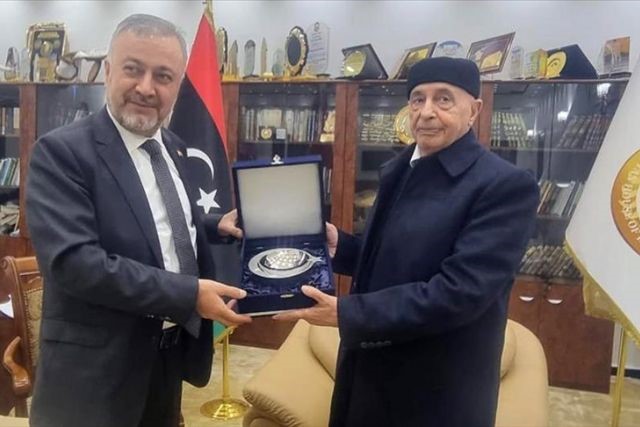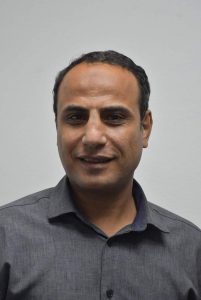Turkey’s relations with the forces dominating eastern Libya have improved following the visit by the Turkish ambassador on the 19th of January. The ambassador met with the Head of the Libyan Parliament Akila Saleh, which is the first meeting of its kind and a sign of the easing of tensions with Turkey. The visit is consistent with the policy of reducing tensions Turkey is pursuing in its immediate region with all its neighbors, as well as on the Libyan front, and is a sign that the Turkish efforts to build bridges of trust in the areas that it is involved in have become the norm. Turkey fears that force in Libya’s east could become part of the ruling coalition to emerge from the coming elections next June. This could adversely affect Turkey’s considerable interests in Libya, and hence the change in policy, which has manifested in a number of ways, including:
Direct contacts with political forces in eastern Libya: Despite tensions between Turkey and the forces in control of eastern Libya, Turkey has recently sought to establish direct contacts. The visit by the Turkish Ambassador to Libya to the Eastern sector on the 19th of January was to meet with Akila Saleh, head of the Libyan parliament. In his statements after the meeting, the Turkish Ambassador noted that the talks were positive and that his country, under the right circumstances, would re-open its consulate in Benghazi. The Turkish Foreign Minister also announced last December that he intended to visit eastern Libya. In a bid to establish good relations with all parties in Libya, he emphasized that Turkey sees Libya as a sister country, with historic ties and a common history, and that there is no difference in this respect between East and West Libya.
Moreover, a delegation from the Libyan parliament had visited Turkey last December, in response to the request of the Turkish National Security Council to build better relations between Turkey and Libya. This visit played a role in improving relations between the two sides, especially as some members of the visiting Libyan delegation had previously been vehemently opposed to Turkish presence in Libya.
Contacts with Ghaddafi’s family: To expand its list of allies in Libya, Turkey has sought to build relations with other factions in Libya, concerned its current allies might not be able to protect Turkish interests there. There appears to be growing resentment from the population of Tripoli towards the armed militias that patrol the streets there and operate under Turkey’s bidding. Hence, the option of becoming closer to the Ghaddafi family to shore up its interests in Libya.
Turkey played a role, behind the scenes, in freeing Said El Ghaddafi from prison, and he showed his gratitude by choosing establishing residence in Turkey following his release last September. Turkey also established contacts with Seif El Ghaddafi after he declared his intention to run for the presidency, viewing him as a strategic choice for several reasons. Due to Seif El Ghaddafi’s popularity with the tribes in eastern Libya, he could play a role in reducing the influence of General Khalifa Haftar, preventing him from running in the presidential elections, or denying him a victory should he actually run. Moreover, Seif also has good relations with the Islamists in Libya as he was the architect of their release during his father’s rule. Finally, close relations with Gaddafi could improve relations between Turkey and the US, as some believe that Washington looks favorably on his bid for presidency.
Flexibility on contentious issues: Turkey lately has shown flexibility on some of the thorny issues with Eastern Libya. Turkey recently hosted the 5+5 joint military committee that includes 5 officers from Haftar’s army during which they achieved a lot of progress in the negotiations concerning Ankara’s withdrawal of its forces from western Libya. Turkey promised to resolve the issue, and did in fact last November, on the eve of the Paris talks on Libya, withdraw a group of mercenaries.
Turkey’s Motives
Turkey’s shift in policy towards eastern Libya can be attributed to the following motives:
Increasing Turkish investments in eastern Libya: Improving relations with eastern Libya is linked to economic motives, and Turkey’s wish to make gains from exploiting the natural resources and reconstruction projects there. Statements by Turkish officials have indicated intentions to increase investments in eastern Libya, and the Turkish Ambassador, on the eve of his meeting with Akila Saleh, stated that Turkish airlines would resume their direct flights to Benghazi.
Countering regional rivals: Turkey is seeking to counter efforts by regional competitors to undermine its position in Libya. Turkey is closely monitoring actions by Egypt and the UAE, especially as Egypt re-opened its embassy in Tripoli last May. This was followed by a slew of visits by Egyptian government officials to the government of Abdelhamid El Debebe. The UAE also followed suit by reopening its embassy in Tripoli on the 17th of January of this year. This has prompted Turkey to counter these moves by building relations with the political forces in eastern Libya.
Affirming the policy of regional good will: Turkey is keen to demonstrate to major regional players, including Egypt, the UAE, and Saudi Arabia, that it is sincere in its policy of establishing common interests and improving cooperation regarding contentious issues. Libya is an important issue in this respect, given the large support it has from these regional powers, specifically Egypt and the UAE. It is worth noting that the détente between Turkey and these regional players has created a climate which allowed Turkey to build bridges with eastern Libya as well.
Enhancing Turkey’s position with Russia and Europe: Turkey’s recent moves to warm relations with eastern Libya is linked to its effort to improve relations with Russia and France, given their open support for Haftar’s forces there. Libya has turned into a contentious issue between Turkey and both France and Russia, which has sought the removal of Turkish military presence in western Libya. Russia’s Foreign Minister has openly declared the “necessity of withdrawing Turkish military forces from Libya, irrespective of their legal standing”. France also lobbied the international community to pressure Turkey to withdraw its forces from Libya.
In sum, Turkey’s shift in policy towards the forces in eastern Libya is in essence an attempt to reinforce Turkey’s presence, and protect its interests in the country, as well as countering efforts to undermine its future role there.


